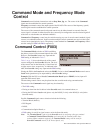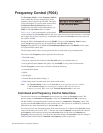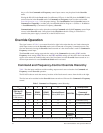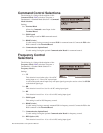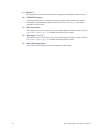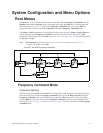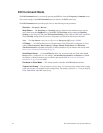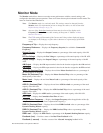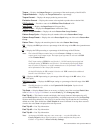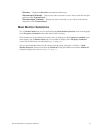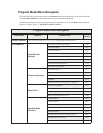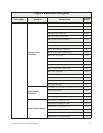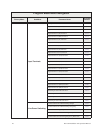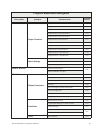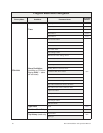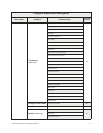
44 H9 ASD Installation and Operation Manual
Torque — Displays the Output Torque as a percentage of the rated capacity of the H9 ASD.
Torque Reference — Displays the Torque Reference as a percentage.
Torque Current — Displays the torque-producing current value.
Excitation Current — Displays the current value required to produce the excitation field.
PID Feedback — Provides a status of the PID Real Time Feedback in Hz.
Input Power — Displays the Input Power in Kilowatts (Kw).
Output Power — Displays the Output Power in Kilowatts (Kw).
Pattern Group Number — Displays the active Pattern Run Group Number.
Pattern Group Cycle — Displays the cycle number of the active Pattern Run Group.
Pattern Group Preset — Displays the active Preset Speed being run of the active Pattern Run
Group.
Pattern Time — Displays the remaining time for the active Pattern Run Group.
RR — Displays the RR input value as a percentage of the full range of the RR value (potentiometer
input).
*V/I — Displays the V/I input setting as a percentage of the full range of the V/I value.
Note: The isolated V/I input terminal may receive Current or Voltage to control the
output speed or the output torque. The input signal type must be selected at SW301
on the Terminal Board.
The V input setting of SW301 is used for the 0 – 10 VDC analog input signal and
the I input setting of SW301 is used for the 0 – 20 mA analog input signal. Either
may be used as a frequency or torque command source. See parameter
F201 for
more information on the setup of this terminal.
On the LCD display the V/I terminal is listed as the VI/II terminal (the additional
letter I is used to indicate “input.”).
RX — Displays the RX input setting as a percentage of the full range of the RX value (-10 to
+10 VDC input).
RX2 Option (AI1) — Displays the RX2 input setting as a percentage of the full range of the RX2
value.
Note: The RX2 function is available on the Expansion IO Card Option 1 option board
(P/N ETB003Z) only.
Trip Code — Displays None if there are no errors, or displays one of the associated Fault Codes
listed in
Table 14 on page 250 if there is an active Fault (e.g., E = Emergency Off).
Past Trip #1 — This function records and displays the last trip incurred. Subsequent trips will
replace Past Trip #1. As trip records are replaced they are shifted to the next level of the Past Trip
locations until being deleted (i.e., Past Trip #1 is moved to Past Trip #2 and then to #3 until being
shifted out of #4). Once shifted out of Past Trip #4 the record is deleted. If no trips have occurred
since the last reset, None is displayed for each trip record.
Past Trip #2 — Past Trip information.
Past Trip #3 — Past Trip information.
Past Trip #4 — Past Trip information.
Note: An improper H9 ASD setup may cause some trips — reset the H9 ASD to the
Factory Default settings before pursuing a systemic malfunction (Program ⇒
Utilities ⇒ Type Reset ⇒ Reset to Factory Settings).



